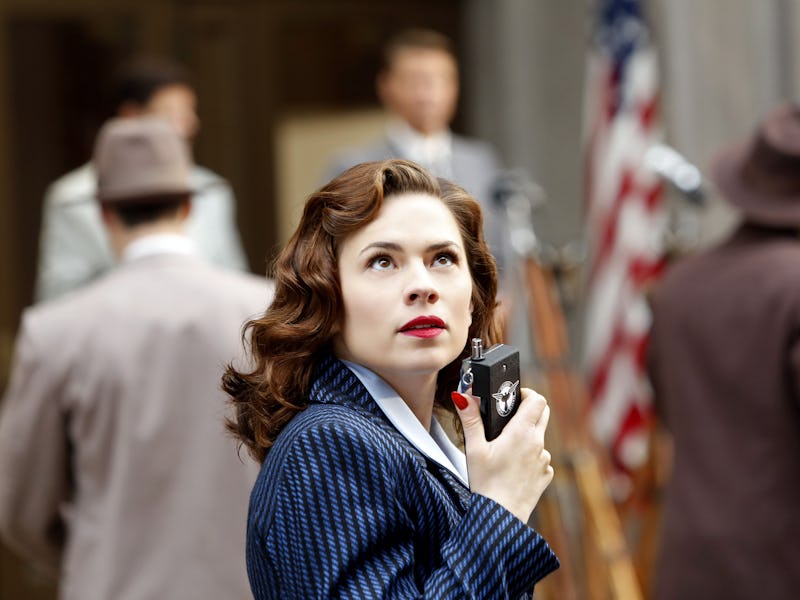Marvel’s Greatest TV Spinoff Never Got Its Due
Agent Carter, reporting for duty.

During the first phase of the MCU, Marvel’s casting choices were nothing short of miraculous. Robert Downey Jr.'s Tony Stark launched a domino effect that transformed the face of Hollywood. Then the Thor franchise introduced the showstopping double-act of Hiddleston and Hemsworth, and Captain America: The First Avenger gave us two of the best MCU supporting characters to date: Sebastian Stan’s deceptively complicated Bucky Barnes, and Hayley Atwell's charismatic Peggy Carter.
Peggy arrived at a time when superhero movies were still figuring out how to revamp and de-tokenize the roles for female love-interests. (And to be frank, that process is still ongoing.) In the 1940s pastiche setting of Captain America, her relationship with Steve Rogers hinged on an appealingly unusual power dynamic. As an established officer working with the federal supersoldier program, Peggy is Steve’s commander, and then colleague. The film draws a contrast between the posturing masculinity of the other prospective supersoldiers, versus Steve’s instinctive respect for Peggy’s abilities. He treats her as an equal — perhaps even as a superior — and we can easily see how they relate to each other as outsiders. Then their budding romance gets cut short by Steve’s apparent demise, leaving Peggy to build a new life in his absence.
In the present-day setting of the Avengers movies, we learn that she became one of the founding members of S.H.I.E.L.D., and went on to start a family. Premiering in 2015, ABC’s short-lived Agent Carter gave us a glimpse of her life after Steve Rogers — and ten years later it remains one of Marvel’s strongest TV spinoffs.
In many respects, Agent Carter is the polar opposite of Marvel's Disney+ TV era. Rather than being a big-budget prestige event like Wandavision or Loki, it feels like the TV equivalent of a specific comicbook subgenre: A quirky solo miniseries about a second-tier character. It prioritizes character development and humor over cataclysmic stakes, and it has clear roots in traditional network TV procedurals, following a case-of-the-week formula with Peggy working at the Strategic Scientific Reserve (SSR), the 1940s precursor to SHIELD.
Much like its title character, Agent Carter thrums with personality. Riffing on the 1940s adventure serial tone of The First Avenger, it reintroduces Peggy in an all-too-plausible scenario for an independent woman in ‘40s America. After building a career in a male-dominated field during WWII, she now faces a barrage of workplace sexism, emphasizing her position as an underdog hero.
Keen to escape the shadow of Captain America, the show introduced a likeable new supporting cast, leaning into the classic superhero concept of living a double life. Posing as a civilian when she’s not at work, Peggy moves into a women’s boarding-house and befriends a diner waitress named Angie. She also gets her own sidekick in the form of Howard Stark's fastidious English butler Jarvis, played with understated charm by James D'Arcy.
Like Steve Rogers, Jarvis is an ideal choice of partner because he doesn’t feel threatened by a female authority figure — in part because he’s used to playing a supporting role to a boss with a big personality. He’s also quickly ruled out as a potential romantic interest, leaving Peggy some narrative breathing room to mourn the love story that defined her role in the movies.
Deftly reminding us that these characters are still experiencing the fallout of a world conflict, Agent Carter gives a serious backbone to its otherwise goofy tone. The SSR’s proto-X-Files remit means plenty of zany storylines about gadgets and gizmos, with Peggy and Jarvis exchanging snappy banter as Peggy sneaks into secret labs, infiltrates glamorous parties, and thwacks goons over the head during action scenes. Delightfully, the show eschews flashy martial arts choreography in favor of making Peggy an old-school bruiser. Her confident physicality is a precursor to Hayley Atwell’s fantastic turn in Mission Impossible: Dead Reckoning, where she achieved the near-impossible feat of matching Tom Cruise’s energy as an action star.
Agent Carter let Atwell’s Peggy Carter lead the double life of many superheroes.
Agent Carter’s two-season run was disappointingly short compared to the sprawling Agents of S.H.I.E.L.D., which offered a more straightforward type of superhero procedural spinoff. Unfortunately, the things that made Agent Carter stand out were also a likely factor in its lower ratings.
Combining a historical setting with social commentary, goofy comedy and sci-fi hijinks, Agent Carter’s creators had a clear vision for how Peggy’s story should be told — and that vision was harder to market than a Marvel procedural set in the present day. In the end it only ran for 18 episodes, but that was more than enough time for Hayley Atwell to make her mark. None of this would work without an actor of her calibre, elegantly balancing Peggy’s wit and toughness with real emotional depth. Agent Carter was a true star vehicle, even if mainstream audiences didn’t quite realize it at the time.